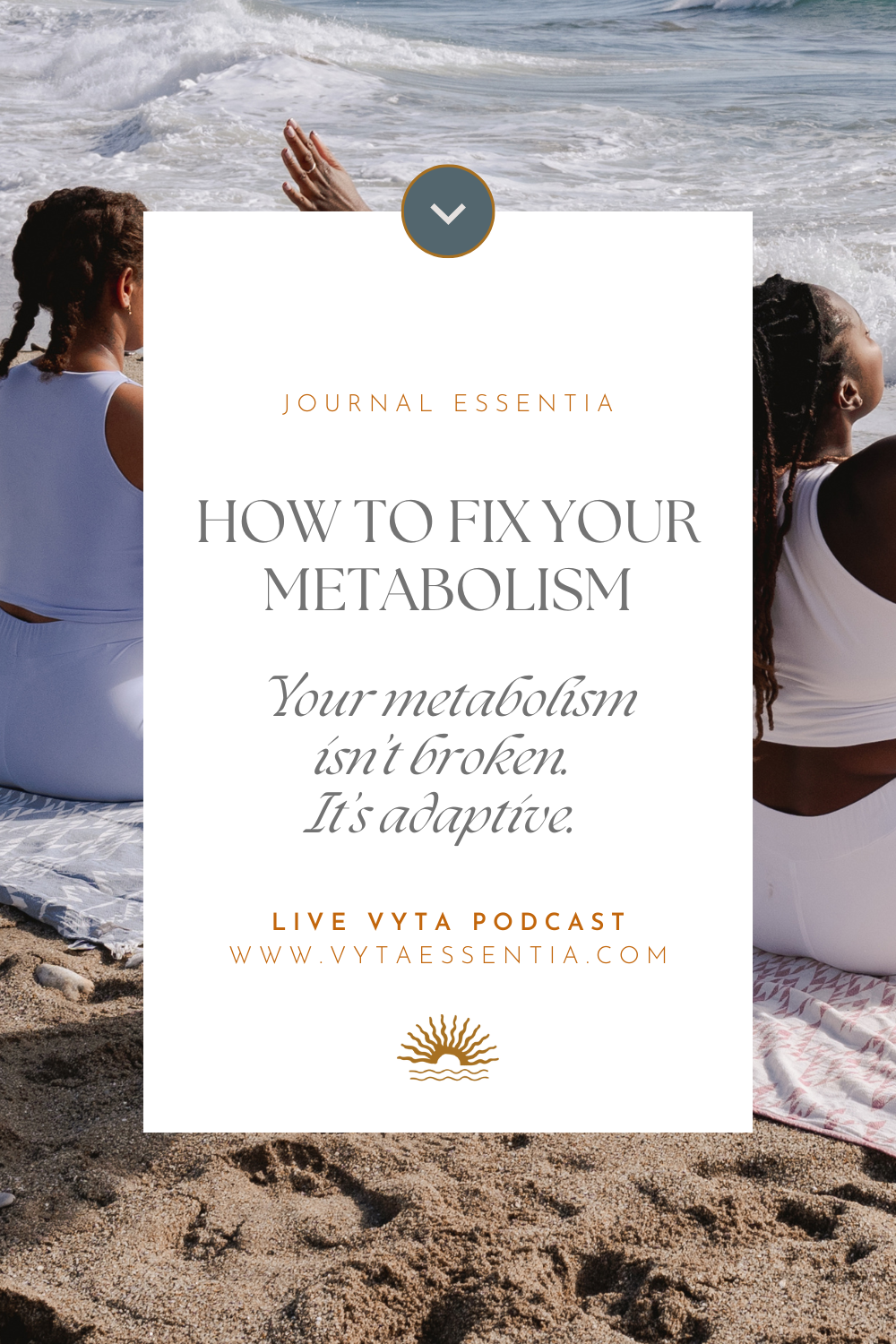How to Fix Your Metabolism
You want to boost your metabolism? Here’s where to start:
This week’s podcast has dropped (link at bottom of the blog) and we’re talking allllll about metabolism. If you want to cut right to the chase, dive into the episode.
Otherwise, this blog is a little overview.
If you’ve been told your metabolism is broken, slowing down with age, or that the only solution is to cut more calories — this post is your reframe.
The truth is: your metabolism isn’t broken. It’s adaptive. And often, it’s under-fueled.
In this post, we’re diving into:
What your metabolism really is (and why it’s more than just fat burning)
Why under-eating and over-exercising stall your progress
The role of carbs in hormonal and thyroid health
The power of ancestral foods for energy, fertility, and resilience
Common signs of metabolic slowdown (including mood, gut, and period issues)
Why women need more food — not less — especially in the luteal phase
Let’s dig in.
What Is Your Metabolism, Really?
Your metabolism is your body’s energy creation system. It’s how your cells convert food, light, and oxygen into usable energy.
It’s not just about burning calories. It’s about supporting your brain, hormones, digestion, and nervous system with enough fuel to function properly.
Your brain, liver, and heart alone require up to 70% of your daily energy just to keep you alive. That means if you’re chronically under-eating, you’re not just affecting your weight — you’re affecting every system in your body.
Why Eating Too Little Slows Your Metabolism
When you undereat (especially for long periods), your body adapts by conserving energy.
This can lead to:
Lower thyroid hormone conversion (T4 to T3)
Higher cortisol levels (stress hormone)
Loss of muscle mass (which lowers your metabolic rate further)
Increased hunger, cravings, and blood sugar crashes
This is called adaptive thermogenesis — your body’s way of slowing down to survive. It’s also why some people’s bodies are really good at putting on weight (hi, hello, it’s me). Your body is intelligent, and is doing this because it senses a threat, and it knows how to survive. Unfortunately, that looks like a “slow down and hold on to weight” phase.
The fix? Eat at maintenance calories to preserve muscle, stabilize hormones, and prevent metabolic adaptation.
The Role of Carbohydrates in Female Hormone Health
One of the most misunderstood nutrients for women is carbohydrates.
Carbs are:
Protein-sparing, helping preserve muscle during weight loss or stress
Critical for thyroid conversion
Supportive for progesterone production and blood sugar stability
A preferred fuel for most of your cells
Low-carb diets can be therapeutic in specific cases, but not ideal for women long-term — especially during your luteal phase, when progesterone is peaking and your metabolism increases slightly.
Studies have found that moderate carb intake (40–50%) supports better thyroid and sex hormone balance in women compared to low-carb diets.
Signs Your Metabolism May Be Struggling
If your body feels off, it may not be "just in your head." Common symptoms of metabolic slowdown include:
Constant fatigue and low energy
Trouble building or maintaining muscle
Intense sugar cravings or energy crashes (esp. mid-morning or mid-afternoon)
Cold hands and feet
Anxiety, especially in the late morning
Sleep disturbances or low libido
Irregular cycles or low progesterone
Digestive issues like bloating or constipation
Many of these are linked to low blood sugar (hypoglycemia), which can be corrected with consistent fueling, especially in the first half of the day.
The Power of Ancestral, Nutrient-Dense Foods
To support your metabolism, thyroid, and hormones, you need more than calories — you need bioavailable nutrients. That’s where ancestral nutrition shines.
Top metabolic-supportive foods include:
Liver (rich in retinol vitamin A, B vitamins, copper and iron)
Oysters (high in zinc, selenium, iodine)
Egg yolks (supportive for vitamin A, D, choline, and brain health)
Bone broth (minerals + gut support)
Seasonal fruits + root veggies (carbs + potassium + vitamin C)
Fermented dairy (supports gut microbiome + provides calcium and B12)
These foods were traditionally prized in indigenous and ancestral cultures — especially for women preparing for pregnancy — because they build life, strength, and resilience.
Energetics: Your Metabolism Mirrors Your Inner World
Beyond biology, your metabolism reflects your inner relationship to nourishment, safety, and trust.
Many women struggle with eating enough because they’ve internalized the message that they must:
Be small
Be in control
Take care of others first
Avoid “too muchness” — of food, emotion, or self-expression
But to build a thriving metabolism, you need:
More food (not restriction)
More safety (nervous system calm)
More softness (especially in your luteal phase)
More truth-telling (hello, throat chakra + thyroid link)
Takeaway: How to Start Supporting Your Metabolism Today
Here are a few small, powerful places to begin:
Eat earlier and more consistently. Start your day with protein + carbs.
Support your luteal phase. Slightly increase carbs and magnesium-rich foods.
Build muscle. Resistance training is one of the best ways to increase metabolic rate.
Prioritize sleep and circadian rhythm. Get morning sunlight and wind down early.
Incorporate nutrient-dense, ancestral foods. Especially liver, eggs, seafood, broth, and root veggies.
Stop glorifying low energy. It’s not a badge of honor — it’s a signal.
Final Word:
Your Metabolism Isn’t Broken — It’s Protecting You
When you support your body with enough food, rest, and rhythm, it will begin to trust again.
And with that trust comes energy, vitality, better digestion, improved hormones — and a sense of grounded ease in your own skin.
Let’s normalize women feeling fueled, not fatigued.
🎧 Listen to the full episode: How to Fix Your Metabolism: The Importance of Maintenance Calories + Metabolic Myths
📥 Grab my FREE Gut & Metabolism Guide
📩 Want more like this? Subscribe to my weekly emails where I share insights on metabolism, body trust, ancestral eating, and nervous system health.

